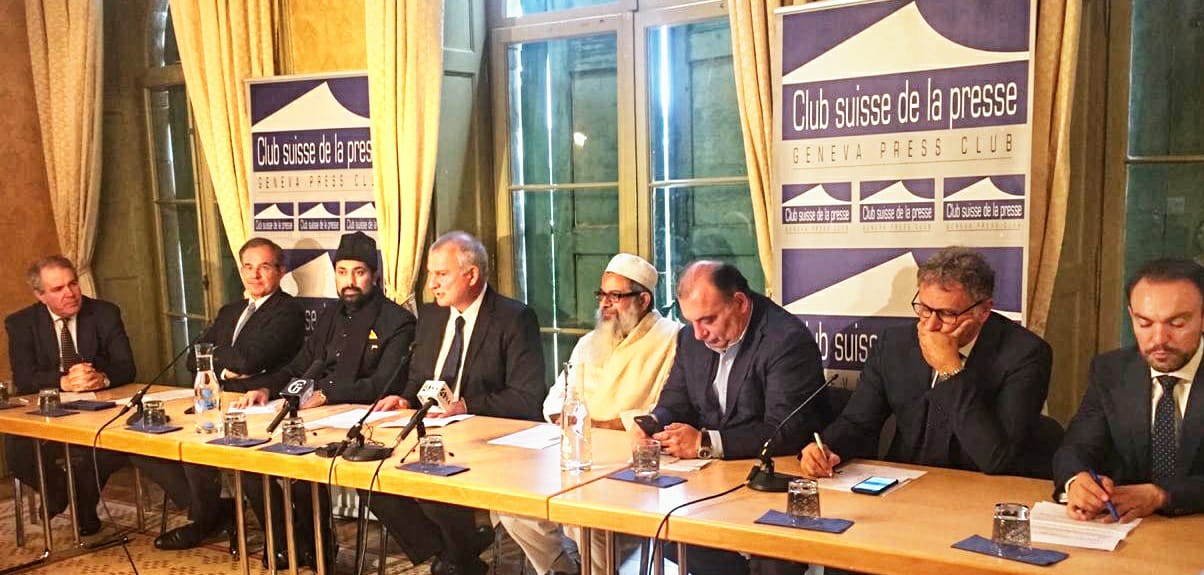Geneva: Members of the European Parliament (MEPs), South Asian scholars, and esteemed leaders from the Indian Muslim community gathered at the Press Club of Geneva on Sunday afternoon to hold a critical dialogue on the current situation in the disputed territories of Jammu and Kashmir (J&K).
The conference was chaired by Paulo Casaca, Executive Director of the South Asia Democratic Forum (SADF), who explored a range of topics related to the image of unrest in the region that has been presented since the beginning of August this year.
Maulana Mehmood Madani, former member of the Indian Parliament and General Secretary of the Muslim organisation Jamiat Ulema-e-Hind, opened the speeches telling the assembled media that his own organisation had held a conference earlier this month. He explained, “Two thousand clerics produced a resolution on behalf of all Indian Muslims calling for the state of affairs in Kashmir to remain an internal issue, one that is not for interference from outside.” There is no question of ownership in his opinion. “Kashmir,” he asserted, “is an integral part of India, with no compromises.” Speaking as an Indian Muslim, Madani asserted, “Pakistan is using the name of Islam to show support to Kashmiris, but on the contrary, it has nothing to do with Islam.”

Former MEP Charles Tannock commended the “secular democracy” of such a vast and diverse country as India. Tannock, who led an MEP delegation to Kashmir in 2007, said: “Twelve years on, I am not at all surprised by the attempt internationally to attack India over the revocation of Article 370.” Personally, he said, “I am fully behind the position of Prime Minister Narendra Modi. India is a democracy. We need to respect that. This has all been done with due process.”


Syed Salman Chisty, 26th Generation Custodian of Holy Key of Ajmer Sharif Dargah, strongly condemned the false claims made by Pakistan of disruption and mayhem in the Kashmir valley after revocation of Article 370 on 5 August. He also said that Indian Muslims have welcomed this decision and believes that Jammu &Kashmir was, is and will always be an integral part of India. He urged all the people in India and abroad to understand the situation of Jammu & Kashmir and respect the fact that “it is our internal Indian matter to revoke Article 370”.
Fulvio Martusciello, MEP clearly stated that “it is India and only India who has rightful legal claim over the entire Jammu & Kashmir.”
The other two Members of the European Parliament, Thierry Mariani and Guiseppe Ferrandino blamed Pakistan for cross-border terrorism and said that Article 370 had become an obstacle in closely integrating Jammu & Kashmir state with the rest of India. It was a tool which Pakistan has used to promote alienation, separatism and militancy in the region, with the consequent loss of around 40,000 Indian citizens, including security forces.
Dr Mario Silva, Former Member of Canadian Parliament & Chairman, International Forum for Rights & Security added, “The full integration of Kashmir into India needs to be encouraged by the international community. Additionally, the integration of Gilgit and Baltistan as the 30th and 31st states of the Republic of India must also be supported.”
Human Rights organisations, NGOs and global citizens concerned have denounced the images and stories that some international media has presented in the wake of the revocation. Yet, Syed Salman Chishty and Maulana Madani claimed that “the reality on the ground is much different”. Chishty himself was adamant that because of the revocation and subsequent developments in the region, “the voices of everyday people in Kashmir who have been oppressed by Pakistan will no longer be silenced”.

